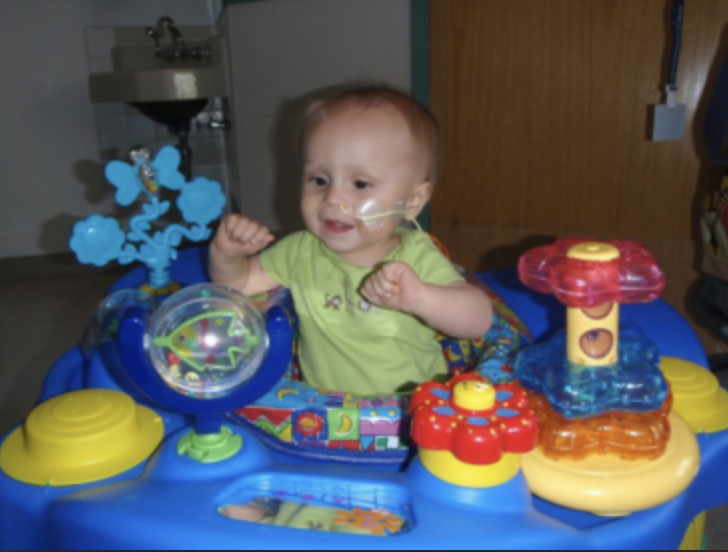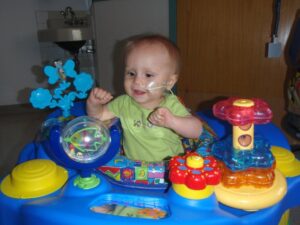Feeding Tube
Feeding your child is a primary role in parenting, and it may feel like an honor to be able to feed your child. When they can’t take in enough food or safely swallow, medical intervention may be necessary. The decision to allow a feeding tube can be one of the most emotionally difficult ones for a family to make. Understanding what nutritional or gastrointestinal needs may arise, and knowing the clinicians who can support you, will give you confidence as you manage and make decisions about your child’s nutritional needs.

Your Team:
A medical professional who practices general medicine.
A specialist in diet and nutrition, both in proactively building a dietary plan and in treating illness related to malnutrition.
A therapist who treats through the therapeutic use of everyday activities. They help patients develop, recover, improve, as well as maintain the skills needed for daily living and working.
A therapist who can assess speech, language, cognitive-communication, and oral/feeding/swallowing skills as well as provide therapies and treatments to address any issues.
A medical specialist in the use of medical imaging (x-ray, MRI, CT, PET) procedures to diagnose injuries and diseases.
A medical specialist in the diagnosis and treatment disorders of the endocrine glands and hormones.
A specialist whose aim is to improve the quality of life of their patients over the course of their illness regardless of stage, by relieving pain and other symptoms of that illness.
An interdisciplinary specialist who helps manage the medical, social and emotional challenges of complex and/or long-term care.
A primary physician will monitor weight and length. A dietician can review nutrition. An occupational therapist and speech therapist have training in sensory and motor issues of the mouth for assessing feeding skills. A speech therapist and radiologist can assess for aspiration. An endocrinologist can assess problems that alter growth. A gastroenterologist and/or complex care and palliative care clinicians can help guide the decisions regarding feeding tubes.
Some children with medical complexity are never able to eat by mouth, and questions about a feeding tube arise early in life. Others will eat by mouth for months or years and then develop problems with swallowing or not eating enough, which can lead to weight loss or lung infections.
A feeding tube allows nutrients to go into the body through a small flexible tube without having to be swallowed. In most cases, a feeding tube delivers food into the stomach, but in some cases the tube delivers nutrition into the small intestine in order to avoid problems with vomiting or reflux.
The medical team may suggest a feeding tube if your child has been feeding orally but now is beginning to aspirate. A clinician may order a swallow study to assess whether the food is going into the lungs instead of the stomach. If so, or if your child is not getting sufficient nutrition for other reasons, it is important to discuss what impact the tube might have on your family’s and child’s overall quality of life. The medical team can help you anticipate what you can expect with or without the tube, so that you can arrive at a decision that feels right for your child and family.
Here are some questions that would prompt consideration:
- Does it take a long time to feed your child, time that you could be spending together in other ways?
- Will a feeding tube help your child have more energy and be more comfortable?
- Will a tube make the delivery of critical medications easier, faster, more effective?
In any of these instances, a clinician may suggest that your child “needs” a feeding tube placement. Remember that the need is determined by your goals, so make certain that your clinical team can clarify what the goals are that a feeding tube will accomplish.
The NeuroJourney section on Nutrition and Growth offers more information on feeding tubes and related topics.
– Kerri, parent of Kai
Related Resources
-
 For each intervention, we asked, “Is this going to benefit his quality of life or our family’s quality of life?”video
For each intervention, we asked, “Is this going to benefit his quality of life or our family’s quality of life?”video -
 Feeding KaiBLOG
Feeding KaiBLOG -
 What is Tube Feeding?guide
What is Tube Feeding?guide -
 She needs the G-Tube so her body can rest.video
She needs the G-Tube so her body can rest.video -
 A Mom on deciding about a feeding tube for her childvideo
A Mom on deciding about a feeding tube for her childvideo -
 A feeding tube: Other parents gave us permission to make our own decisionvideo
A feeding tube: Other parents gave us permission to make our own decisionvideo